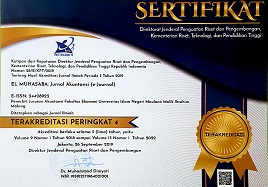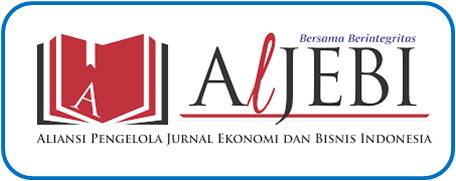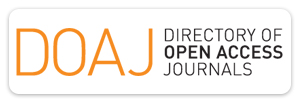Metaverse dalam Akuntansi yang Ditinjau dari Perspektif Filosofi Realitas Plato
Abstract
Purpose: This paper aims to review the metaverse in accounting from the perspective of Plato's philosophy of reality.
Method: This study uses the library research method to obtain an understanding and general description regarding the metaverse in accounting from Plato's perspective.
Results: The result shows that accounting can be a tool because its development leads to a blockchain system which can later become a means of exchange in the metaverse. It turns out that the metaverse can change accounting in five ways. First, the metaverse will allow direct engagement with the client. Second, training and development of new team members that can be done through the metaverse. Third, increase employee interaction. And fourth, the existence of a metaverse will form a more intense relationship with consumers. Finally, this metaverse does have many benefits and conveniences for its users. But, despite all that, the issue of user data security is still a major concern, so it is hoped that in the future the metaverse can develop better.
Implications: This research contributes to the development of literature related to the metaverse, especially accounting in terms of Plato's philosophy of reality.
Novelty: This study is the first article to review how the metaverse in accounting is viewed from the point of view of Plato's philosophy of reality.
Keywords
Full Text:
PDFReferences
Burhan, F. A. (2021). Mantan Bos Google Ungkap Dampak Buruk Dunia Virtual Metaverse. https://katadata.co.id/desysetyowati/digital/618203b0ab65a/mantan-bos-google-ungkap-dampak-buruk-dunia-virtual-metaverse
Buterin, V. (2014). A next-generation smart contract and decentralized application platform. White Paper, 3(37).
Cai, W., Wang, Z., Ernst, J. B., Hong, Z., Feng, C., & Leung, V. C. M. (2018). Decentralized applications: The blockchain-empowered software system. IEEE Access, 6, 53019–53033.
Chaum, D. L. (1979). Computer Systems established, maintained and trusted by mutually suspicious groups. Electronics Research Laboratory, University of California.
Chithrananda, S. (2019). Plato — Understanding His Philosophies and the Allegory of the Cave.
Digitalis. (2020). Pengaruh Blockchain kepada Bidang Akuntansi dan Audit. https://digitalis.id/blog/blockchain-bidang-akuntansi-auditor/
Dionisio, J. D. N., Iii, W. G. B., & Gilbert, R. (2013). 3D Virtual worlds and the metaverse: Current status and future possibilities. ACM Computing Surveys, 45(3), 1–38. https://doi.org/10.1145/2480741.2480751
Duan, H., Li, J., Fan, S., Lin, Z., Wu, X., & Cai, W. (2021). Metaverse for social good: A university campus prototype. Proceedings of the 29th ACM International Conference on Multimedia, 153–161.
Gertrudes, D. (2022). 5 ways the Metaverse will change accounting. https://www.accountingtoday.com/list/5-ways-the-metaverse-will-change-accounting
Lee, L.-H., Braud, T., Zhou, P., Wang, L., Xu, D., Lin, Z., Kumar, A., Bermejo, C., & Hui, P. (2021). All one needs to know about metaverse: A complete survey on technological singularity, virtual ecosystem, and research agenda. https://doi.org/10.48550/ARXIV.2110.05352
Min, T., Wang, H., Guo, Y., & Cai, W. (2019). Blockchain games: A survey. 2019 IEEE Conference on Games (CoG), 1–8.
Mirzaqon, A., & Purwoko. (n.d.). Studi Kepustakaan Mengenai Landasan Teori Dan Praktik Konseling Expressive Writing. 1–8.
Mystakidis, S. (2022). Metaverse. Encyclopedia, 2(1), 486–497. https://doi.org/10.3390/encyclopedia2010031
Nakamoto, S. (2008). Bitcoin: A peer-to-peer electronic cash system. Decentralized Business Review, 21260.
Nofer, M., Gomber, P., Hinz, O., & Schiereck, D. (2017). Blockchain. Business & Information Systems Engineering, 59(3), 183–187.
Radoff, J. (2021). The Metaverse Value-Chain. https://medium.com/building-the-metaverse/the-metaverse-value-chain-afcf9e09e3a7
Schaltegger, S. (2017). Sustainability as a fundamental challenge for management accountants. In The Role of the Management Accountant (pp. 274–291). Routledge.
Sedley, D. (2016). An introduction to plato’s theory of forms. Royal Institute of Philosophy Supplement, 78, 3–22. https://doi.org/10.1017/S1358246116000333
Sparkes, M. (2021). What is a metaverse. New Scientist, 251(3348), 18. https://doi.org/10.1016/S0262-4079(21)01450-0
Stephenson, N. (2014). Snow crash. Bragelonne.
Yang, Q., Zhao, Y., Huang, H., Xiong, Z., Kang, J., & Zheng, Z. (2022). Fusing blockchain and ai with metaverse: A survey. IEEE Open Journal of the Computer Society, 3, 122–136. https://doi.org/10.1109/OJCS.2022.3188249
DOI: https://doi.org/10.18860/em.v14i1.15652
Refbacks
- There are currently no refbacks.
Editorial Office:
Megawati Soekarnoputri Building
Accounting Department, Faculty of Economics
Jln. Gajayana 50 Telp (0341) 558881
E-mail: elmuhasaba@uin-malang.ac.id
Universitas Islam Negeri Maulana Malik Ibrahim Malang
E-ISSN 2442-8922
P-ISSN 2086-1249

This work is licensed under a CC BY SA 4.0 International License


















